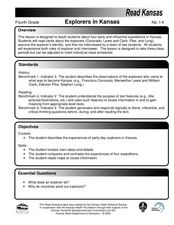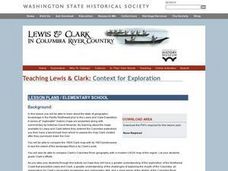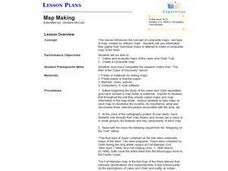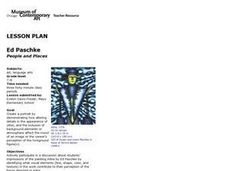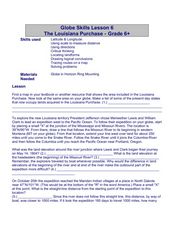Curated OER
Non-Fiction Text Features
Distinguish between textual features of non-fiction in the book The Lewis and Clark Expedition and in the non-fiction story "Ta-Na-e-Ka." Third graders create posters and participate in group discussions to show their understanding of...
Curated OER
A Funny Happened on the Way to Monticello
Third graders examine the Journey of Lewis and Clark and how it relates to Thomas Jefferson and Monticello. They read about, discuss and complete worksheet pertaining to the Lewis and Clark expedition.
Curated OER
History in Pictures
Sixth graders interpret diary entries, letters and read maps to better understand portions of history. They create an oral presentation demonstrating understanding of how cultural characteristics have been communicated through art,...
Curated OER
Who are the Women of the Pacific North West: 1830-1870?
Students view a picture from the Vancouver National Historic Reserve and discuss the people in the picture. They locate Cromwell's Map and discuss the villages located close to Fort Vancouver. Students read information regarding the role...
Curated OER
The Louisiana Purchase: Worksheet
Celebrate the anniversary of one of the United States' most important land acquisitions with a fun learning exercise. The class answers five matching questions related to those involved with the Louisiana Purchase and then think about...
Curated OER
Explorers in Kansas
Fourth graders read cards about the explorers: Coronado, Lewis, and Clark, Pike, and Long. In this influential expeditions activity, 4th graders describe and observe explorers who came to Kansas. Students locate main reasons and details...
Curated OER
Corps of Discovery
Students assess their knowledge of the Corps of Discovery through a written pretest, follow the journey of Lewis and Clark on the internet, record data on events, dates, places, people, animals, distance traveled, and geographic...
Curated OER
Grade 8 Unit 4
Eighth graders analyze aspirations and ideals of the people of the new nation, in terms of its physical landscapes and political divisions, and the territorial expansion of the United States during the terms of the first four presidents.
NOAA
To Explore Strange New Worlds
It's time to boldly go where your class has not gone before! The introductory lesson in a five-part series takes young oceanographers aboard the NOAA Ship Okeanos to begin a study of ocean exploration. The lesson includes a comparison of...
Curated OER
Lewis and Clark In Columbia River Country Fort Clatsop
Tenth graders complete an online activity about the winter camp of Lewis and Clark at Fort Clatsop. They determine why the vote about the location what significant and make a decision on how they would have voted. They interact a with at...
Curated OER
Carbondale: The Biography of a Coal Town
Students use a brief history of the growth and decline of the anthracite region in the state to create a photograph and map "peak shaped" time line. They practice map and photo analysis strategies to "read" photographs and maps.
Curated OER
American History Through Architectural Masterpieces: Monticello
Students examine the life of Thomas Jefferson, explore great American landmark Monticello, discover relationships between climate, geographical factors, and time as to what kind of architecture was used, conduct research online, write a...
Curated OER
Context for Exploration
Young scholars examine watershed maps from the Columbia River. They practice using maps and create their own watershed map. They share their map with the class.
Curated OER
Geography: Map Making
Students, working in groups, share notes and maps collected during a study of the Lewis and Clark Expedition. They draw large composite maps of the western United States on butcher paper including land formations, bodies of water, and...
Curated OER
People and Places
Fifth graders investigate how the geography of the land effected the human experience of the Lewis and Clark Expedition. They research using primary and secondary sources, design a map.
Curated OER
The Gold Rush
Students identify the routes involved in the Gold Rush on a map. In this map skills lesson, students use a United States map to locate the routes used to travel to California during the Gold Rush. Students demonstrate how to use the map...
Curated OER
Who IS That Woman?
Learners participate in a jigsaw reading activity about the contributions of Sacagawea to the Corps of Discovery. They also write a poem to reflect upon what they studied.
Curated OER
Globe Skills Lesson 6 The Louisiana Purchase
Students explore the Louisiana Purchase territory. In this geography skills lesson, students use map skills in order to plot and note latitude and longitude, measure scale distance, and locate landforms that were part of the Louisiana...
Curated OER
Westward Expansion
In this westward expansion worksheet, students read and assess comprehension. In this short answer, matching, and timeline worksheet, students write answers to twenty-five questions.
Curated OER
Rivers to the West
Students discuss the Lewis and Clark expedition, and the reasons they may have chosen to follow certain rivers. They list the rivers that start from St. Louis and follow the route of Lewis and Clark. Students trace and label the rivers...
Curated OER
Fort Clatsop: The Corps of Discovery's Winter at Fort Clatsop
Students investigate the Lewis and Clark expedition and how it helped to shape American expansion during its early history. Students reflect upon the period of history and its implications for America.
Curated OER
Which Side Is Which?
Students study the Louisiana Purchase and the journey of Lewis and Clark. They examine the Peace Medal nickel to differentiate between the heads side and tails side. They participate in a coin flip activity, graph the results and analyze...
Curated OER
Geometry: Classifying Angles
Learners measure, construct, and classify angles as acute, right, straight, and obtuse. Once they have completed an angle worksheet, students use a map of South Carolina to locate cities by constructing the aforementioned angles.
Messenger Education
Exploring Exploring
The reason people first began trading was because of their desires for objects other societies possessed. In the activity, classes discuss why exploration has been a common thread in all societies and where these desires have taken...







